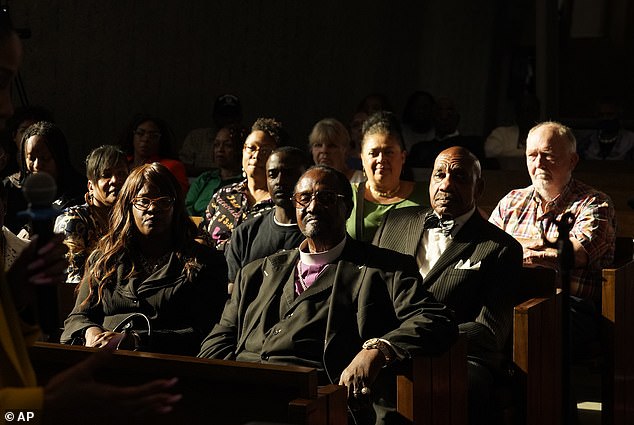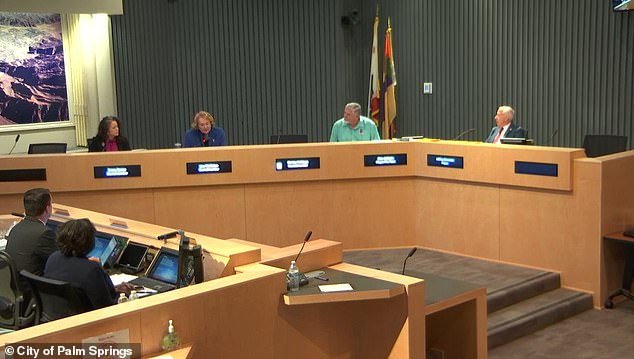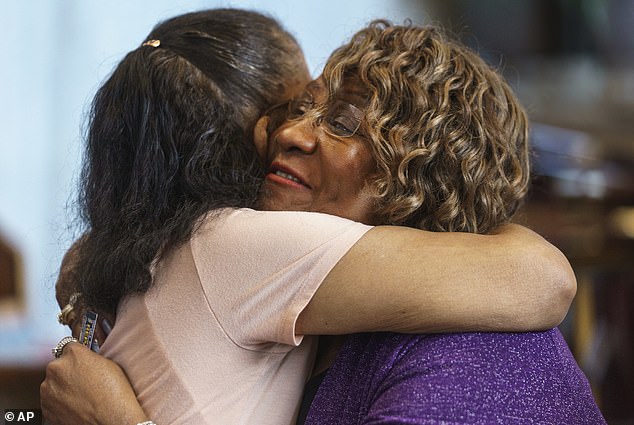A California city will vote on whether to approve a nearly $6 million reparations deal for Black and Latino families whose neighborhood was razed in the 1960s.
Section 14 of Palm Springs, a one-mile stretch owned by the Agua Caliente Band of Cahuilla Indians, was destroyed by city officials to make way for commercial development in the mid-1960s.
More than 230 structures in the neighborhood, where African American and Latino families built and rented homes, were demolished and burned by the city’s fire department between 1965 and 1967. reports the New York Times.
It was one of the few places where minorities could live due to discriminatory housing restrictions in place at the time, after a change in federal law allowed the tribe to lease the land for up to 99 years.
The former residents have now agreed to a $5.9 million settlement, which the city council is expected to vote on at a public meeting on Thursday.
Members of the Palm Springs Section 14 Survivors group approved a $5.9 million settlement for the destruction of their neighborhood in the 1960s
He is also scheduled to vote on a package that would include up to another $21 million for housing, economic development and small business programs.
The city had already set aside $20 million of its funds to spend over the next decade on “affordable homeownership” for first-time buyers and had established a community land trust for low-income residents.
Those living in Section 14 and their descendants would receive priority access.
Under the proposal, an additional $1 million would also be used to support small businesses through grants and low-interest loans.
Also included in the sizeable deal is a Section 14 monument, along with naming rights for a future public park and racial healing centre. KESQ reports.
Members of the Palm Springs Section 14 Survivors group praised the agreement, which they formally accepted Wednesday.
“We have been fighting for a long time to tell our story,” Margarita Genera, 86, who lived with her parents and two siblings in the neighborhood, told the Times.

Former Section 14 residents have long maintained that they were evicted with little or no notice before their homes were destroyed.
Former residents have long maintained that they were evicted with little or no notice before their homes were destroyed, but a 1968 California state investigation concluded that the city showed “civil disregard” for the rights of its minority residents, but there was no evidence of any crime. They were engaged.
City officials did not acknowledge their wrongdoing until 2021, when they formally apologized for the evictions.
The following year, the survivors’ group filed a tort lawsuit, alleging that the forced evictions were illegal and constituted “racially motivated attacks.”
He compared the tragedy to the violence that decimated a vibrant community known as Black Wall Street in 1921, leaving up to 300 people dead, although no deaths were reported in connection with the displacement of Section 14 families.
“This was a community that was told they didn’t deserve it. They were told they were a menace, an eyesore, a public nuisance,” said Areva Martin, a Los Angeles-based civil rights attorney representing the group.
“It was about acknowledging the damage that was done.”

The Palm Springs City Council is expected to vote on the deal Thursday.
The city council finally approved a package to address historic injustices, including a cash settlement of about $4.3 million in April.
It was increased to $5.9 million last week, after city officials received updated information that approximately 197 homes participated in the original reduction, compared to the 145 homes previously identified. according to the Palm Springs Mail.
That money will now be divided between verified former residents and their descendants.
Martin said there were about 300 people in the group, but he hoped a smaller number would qualify.
Pearl Devers, who organized the survivors’ group, said the agreement should have been reached a long time ago.
“While no amount of money can fully restore what we lost, this agreement helps pave the way so we can all finally move forward.”
Mayor Jeffrey Bernstein also said in a statement: ‘The City Council is deeply pleased that the former Section 14 residents have agreed to accept what we believe is a fair and equitable settlement offer.
‘The City Council has always respected the historic importance of Section 14, and with this resolution of the complaint… we are taking bold and important steps that will create lasting benefits for our entire community, while also providing programs that prioritize supporting the former residents of Section 14.’


